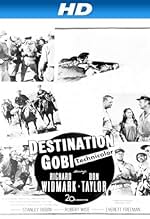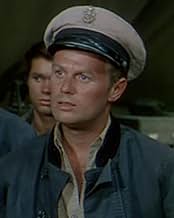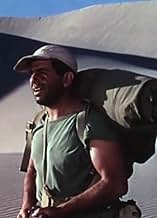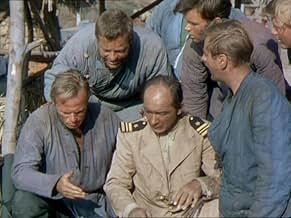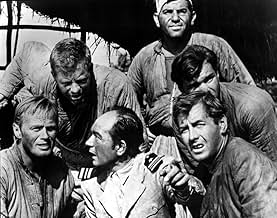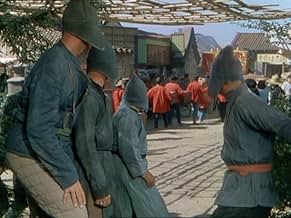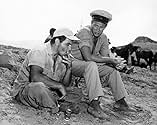IMDb RATING
6.3/10
1.2K
YOUR RATING
In 1944, US Navy specialists run a weather station in the Gobi desert where they are harassed by Japanese warplanes but aided by local Mongol nomads.In 1944, US Navy specialists run a weather station in the Gobi desert where they are harassed by Japanese warplanes but aided by local Mongol nomads.In 1944, US Navy specialists run a weather station in the Gobi desert where they are harassed by Japanese warplanes but aided by local Mongol nomads.
Max Showalter
- Walter Landers
- (as Casey Adams)
Edgar Barrier
- Yin Tang
- (uncredited)
Willis Bouchey
- Capt. Gates
- (uncredited)
James Conaty
- Admiral
- (uncredited)
Franklyn Farnum
- Quartermaster General
- (uncredited)
John Hedloe
- Pilot
- (uncredited)
Earl Holliman
- Frank Swenson
- (uncredited)
Frank Iwanaga
- Lieutenant
- (uncredited)
Featured reviews
I saw Destination Gobi in 1953. I looked for a copy of the movie for years until I was able to get it on DVD. I have watched this movie several times since, and enjoy each viewing.
I differ from some of the more critical reviews. Too often the reviews come off as the "want-to- be movie critics", who seem to nitpick this and that. They fail to recognize that some movies are meant for just entertainment. Destination Gobi falls into this category. It wasn't meant to become Movie of the Year, nor to compete with Gone With the Wind.
I have most of the war movies made in my DVD library. World War II created many Hollywood opportunities in creating movies, along with governmental approval to boost patriotism. And, Hollywood produced many, some great, others poor. Movie goers liked some, disliked others. It's just a matter of one's own personal view of what they're looking for in a film. If it's for their desire to have an opportunity to become a pseudo-movie critic, then so be it. I watch movies for entertainment
I differ from some of the more critical reviews. Too often the reviews come off as the "want-to- be movie critics", who seem to nitpick this and that. They fail to recognize that some movies are meant for just entertainment. Destination Gobi falls into this category. It wasn't meant to become Movie of the Year, nor to compete with Gone With the Wind.
I have most of the war movies made in my DVD library. World War II created many Hollywood opportunities in creating movies, along with governmental approval to boost patriotism. And, Hollywood produced many, some great, others poor. Movie goers liked some, disliked others. It's just a matter of one's own personal view of what they're looking for in a film. If it's for their desire to have an opportunity to become a pseudo-movie critic, then so be it. I watch movies for entertainment
While supposedly presenting “one of the strangest stories of WWII” (denoted in historical records merely by the cryptic phrase “Saddles For Gobi” – explained later), this film hardly constitutes the most engrossing or exciting war adventure to be depicted on the screen…and, besides, emerges as an even greater disappointment coming from a director of Wise’s stature! That said, the unusual desert location and attractive color cinematography makes it a pleasant – if forgettable – actioner. Apart from this, the fact that it’s one of Wise’s (and star Richard Widmark’s) rarest efforts, has made me leap at the chance of acquiring a copy of it (albeit an imperfect one, given the alarmingly frequent jerkiness of the image) – gleaned from a broadcast on French Satellite TV! – particularly in view of Widmark’s recent passing.
The interesting thing here is that, what starts off as a routine mission involving U.S. Navy personnel operating in a desert weather station, develops into a story of survival – as, following an aerial attack by the Japanese, the remaining members of the outfit trek towards the sea in an attempt to reach the Navy base on duty at Okinawa. Ironically, both the studio (Fox) and the star involved had already made a film about that campaign – Lewis Milestone’s HALLS OF MONTEZUMA (1950), which I’d watched on Italian TV but may check out again now (on DVD-R) as part of my ongoing Widmark tribute.
Amidst the typical camaraderie, the men suffer the elements, manage an unexpected alliance with a horde of Mongols (achieved by procuring the latter with saddles for their horses requisitioned from the U.S.!), are conned by a shady camel merchant, apparently betrayed to the Japanese forces by the Mongols themselves (though it transpires that the latter’s internment camp is actually close to the seashore) and then fight off the enemy on a ramshackle river boat. In the end, it’s certainly watchable and efficiently enough handled – but, as I said, the material per se isn’t inspiring enough to bring out the best from the talents involved…
The interesting thing here is that, what starts off as a routine mission involving U.S. Navy personnel operating in a desert weather station, develops into a story of survival – as, following an aerial attack by the Japanese, the remaining members of the outfit trek towards the sea in an attempt to reach the Navy base on duty at Okinawa. Ironically, both the studio (Fox) and the star involved had already made a film about that campaign – Lewis Milestone’s HALLS OF MONTEZUMA (1950), which I’d watched on Italian TV but may check out again now (on DVD-R) as part of my ongoing Widmark tribute.
Amidst the typical camaraderie, the men suffer the elements, manage an unexpected alliance with a horde of Mongols (achieved by procuring the latter with saddles for their horses requisitioned from the U.S.!), are conned by a shady camel merchant, apparently betrayed to the Japanese forces by the Mongols themselves (though it transpires that the latter’s internment camp is actually close to the seashore) and then fight off the enemy on a ramshackle river boat. In the end, it’s certainly watchable and efficiently enough handled – but, as I said, the material per se isn’t inspiring enough to bring out the best from the talents involved…
My father was a part of this group, they were actually called SACO. He liked this movie, thought it was somewhat accurate. He was a Navy Chief Petty Officer, a Medic, he loved Mongolia, it reminded him of Montana, where he grew up, and he admired the people. He liked the humor in it. They were actually a sort of obscure, almost "guerilla" group. Kind of like Navy Calvary. I thought it was called "Saddles for SACO", (maybe another earlier title?). He always felt it was a great mistake to underestimate the indigenous people, he used to use Mr.Custer as an example. All the West Point training or Annapolis , for that , purpose , may not help you in the end.And he told me, all Americans think they're John Wayne, unfortunately, those ponies didn't always know.
The title suggests something more rugged. But for once they weren't joking when the opening crawl declared this "one of the strangest stories of World War II" (although they probably were when they cast Mervyn Vye as the leader of "the First Mongolian Cavalry". While another of the locals is a kleptomaniac nicknamed 'Harpo' who like his namesake communicates through mime).
The tale of "a bunch of weathermen chasing balloons" across Inner Mongolia, the most arduous part of shooting Robert Wise's first colour film was probably lugging the enormous Technicolor camera about; which paradoxically makes it incongruously pretty to contemplate.
The tale of "a bunch of weathermen chasing balloons" across Inner Mongolia, the most arduous part of shooting Robert Wise's first colour film was probably lugging the enormous Technicolor camera about; which paradoxically makes it incongruously pretty to contemplate.
Destination Gobi is directed by Robert Wise and written by Everett Freeman. It stars Richard Widmark, Don Taylor, Casey Adams & Murvyn Vye.
"In the Navy records in Washington, there is an obscure entry reading 'Saddles for Gobi.' This film is based on the story behind that entry--one of the strangest stories of World War II."
An odd story makes for an oddly entertaining yarn as Widmark and co troop across the Gobi Desert after a Japanese air attack on their weather station base. Other problems exist too, as the Mongol tribe they have befriended may not actually be friends. Poor Widmark, he's a Navy man out in the desert and the motley crew under his command are getting rather restless.
Amazingly based on a true incident, tho we can safely assume there's much poetic license used by the makers, Destination Gobi has a nice blend of action, drama, adventure and comedy. The cast work well as a unit and run with the oddity of the plot, while Wise directs with customary assuredness. It's not one you would sit thru too often once viewed for the first time, but while it's on it's never less than engaging . 6.5/10
"In the Navy records in Washington, there is an obscure entry reading 'Saddles for Gobi.' This film is based on the story behind that entry--one of the strangest stories of World War II."
An odd story makes for an oddly entertaining yarn as Widmark and co troop across the Gobi Desert after a Japanese air attack on their weather station base. Other problems exist too, as the Mongol tribe they have befriended may not actually be friends. Poor Widmark, he's a Navy man out in the desert and the motley crew under his command are getting rather restless.
Amazingly based on a true incident, tho we can safely assume there's much poetic license used by the makers, Destination Gobi has a nice blend of action, drama, adventure and comedy. The cast work well as a unit and run with the oddity of the plot, while Wise directs with customary assuredness. It's not one you would sit thru too often once viewed for the first time, but while it's on it's never less than engaging . 6.5/10
Did you know
- TriviaNixon and Fallon, NV were both used as location sites, and Paiute Indians residing on a reservation in Nixon played Mongol extras.
- GoofsMcHale claims that "Gobi Desert" means "wall of spears." Actually, "Gobi" is the Mongolian word for "desert."
- Quotes
[Walter flirts successfully with a Mongolian woman]
Jenkins: Well, looks like you made a hit, Walter my boy. Tell me, how do you do it?
Walter Landers: My training as a meterorologist. I can take one look at a girl and tell weather.
- Crazy creditsOpening credits prologue: In the Navy records in Washington, there is an obscure entry reading "Saddles for Gobi."
This film is based on the story behind that entry--one of the strangest stories of World War II.
- ConnectionsEdited into All This and World War II (1976)
- How long is Destination Gobi?Powered by Alexa
Details
Box office
- Budget
- $1,340,000 (estimated)
- Runtime
- 1h 30m(90 min)
- Color
- Aspect ratio
- 1.37 : 1
Contribute to this page
Suggest an edit or add missing content


